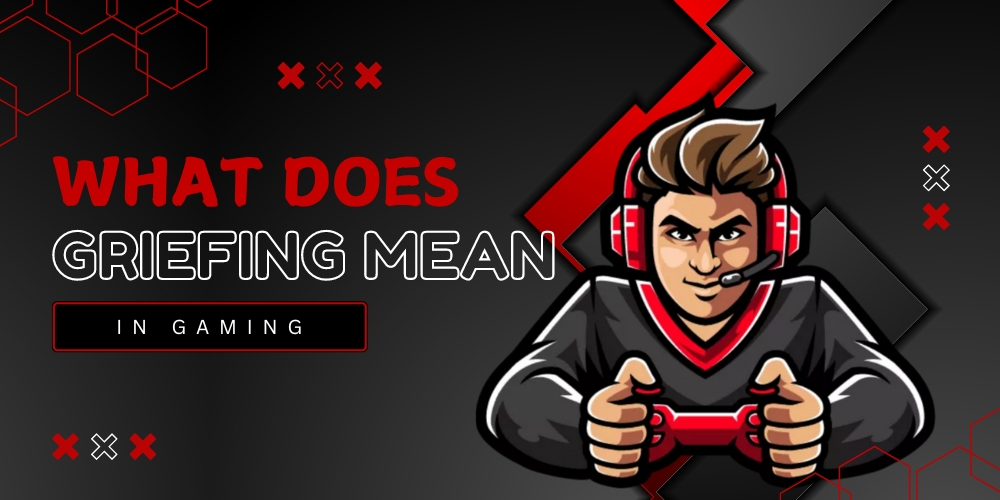Regarding video games, “griefing” is the deliberate, recurring act of acting disruptively or unsportsmanlike with the goal of upsetting, frustrating, or upsetting other players. Many people believe that grieving is a bad habit that ruins a game’s fun and fair play. Grieving can create a bad atmosphere, make the game unfair, and might make players leave the community. To prevent this, game admins and developers usually use tools like reporting systems, punishments, or limits on specific actions. Let’s talk about what griefing means in gaming!
Moreover, fostering a positive and friendly gaming community can reduce the occurrence of negative behaviour and create a more enjoyable and respectful environment for everyone involved.
What Is Meant by “Griefing People”?
The consensus in most video games is that cooperative players should cooperate to accomplish the common objective. Contrary to that idea, grieving describes those who consciously work to reduce their team’s chances of winning a game. When you’re grieving, you might shoot other members of your team or do different actions to undermine them, including deviating from the planned strategy.
What Causes Gamers to Cry in Online Games?
There are various reasons why individuals may behave negatively in games. Some may take pleasure in distressing others, while others might engage in this behavior to retaliate or manipulate fellow players. It is essential to recognize that not every action that irritates others is intended to be harmful. The main difference is when someone repeatedly misbehaves on purpose to make others uncomfortable or mess up their game.
Different kinds of mourners
When griefing, malicious players behave differently depending on the game and genre. They all like to ruin other people’s fun when they play an online game. usually try to do the most damage they can or prevent other players from progressing to the next level. They won’t play the game as you’re supposed to, and their goal is to do this no matter how.
When a person is grieving online, it typically indicates that they aim to disrupt others’ enjoyment and deliberately create difficulties for them. The individual engaging in grief seeks to irritate everyone as much as possible, and numerous methods exist. Griefing doesn’t look the same in every game because every game has slightly different rules. In one game, you might score your own goal by kicking the ball into your team’s net in soccer.
What Does Befall Bereavement?
Grieving might manifest in many ways depending on the game and its rules. Typical instances of grieving include:
Mistreatment
Grievers may harass some players repeatedly, using harsh or disparaging language, making personal assaults, or insulting them excessively. This activity aims to incite a negative feeling and establish a hostile environment.
Sabotage Team
In cooperative multiplayer video games, a griefer will intentionally try to sabotage their own team by purposely disrupting the game, blocking progression, or being overtly antagonistic towards their team. This can be done by deliberately letting enemies kill them, blocking player movement, or causing friendly fire.
Camping or Killing with a semblance
Grievers may kill players instantly upon their respawn, denying them a fair opportunity to engage in the game. This can happen frequently. This tactic ruins the flow of the game and irritates the targeted participants.
Griefers take advantage of the weaknesses
Flaws found in a game’s design to obtain an unfair edge or disrupt the enjoyment of other players. This conduct may include using cheats or hacks that are not allowed, misusing powerful abilities, or intentionally activating bugs that negatively impact gameplay. In games featuring resource gathering or base building, griefers can exploit or harm other players’ resources, structures, or progress. This behaviour can result in frustration and impede the progress of their opponents.
What Causes Grief in Individuals?
There are several reasons why players may experience grief:
- Trolling: Some grieving individuals find it entertaining to mock others and observe their reactions. For some individuals, witnessing the annoyance or anger they provoke can be fun. Grievers frequently find satisfaction in exerting control over others and may use game features to feel superior or dominant.
- Boredom can also lead grievers to act out, using the enjoyment of others as a way to occupy their time. Besides, griefing can be a form of retaliation, in which a player focuses on individuals they feel have wronged them. This behaviour typically arises when a player feels insulted or mistreated. The impacts of griefing can damage both newcomers and experienced gamers and the gaming community.
- This manifests in some ways: persistent griefing can lead to frustration and burnout, causing players to abandon the game entirely.
- What’s more, griefing encourages a toxic gaming culture where bullying, harassment, and unsportsmanlike conduct become normalised. Lastly, it disrupts the integrity of competitive play in video games, shifting the focus away from skill.
Why is there grieving in the world?
To the dismay of others, some merely take pleasure in causing destruction and impeding others. In this sense, griefing can cause genuine harm to game producers and be disruptive. For instance, there is a financial loss when players of membership-based online games get disinterested in the game after being exposed to griefers due to insufficient moderation. Grievers are partially motivated by the knowledge that they annoy other people. This is most simply analogous to the idea of schadenfreude in real life. In every sense of the phrase, naysayers are spoilers. Some even live-stream their actions because they know a market exists.
To summarise
Online gaming can sometimes be frustrating and disruptive; however, understanding what griefing is and how to address it can significantly enhance your experience. Both players and developers are actively working to create enjoyable and fair situations for everyone, whether through in-game tools or community oversight.


